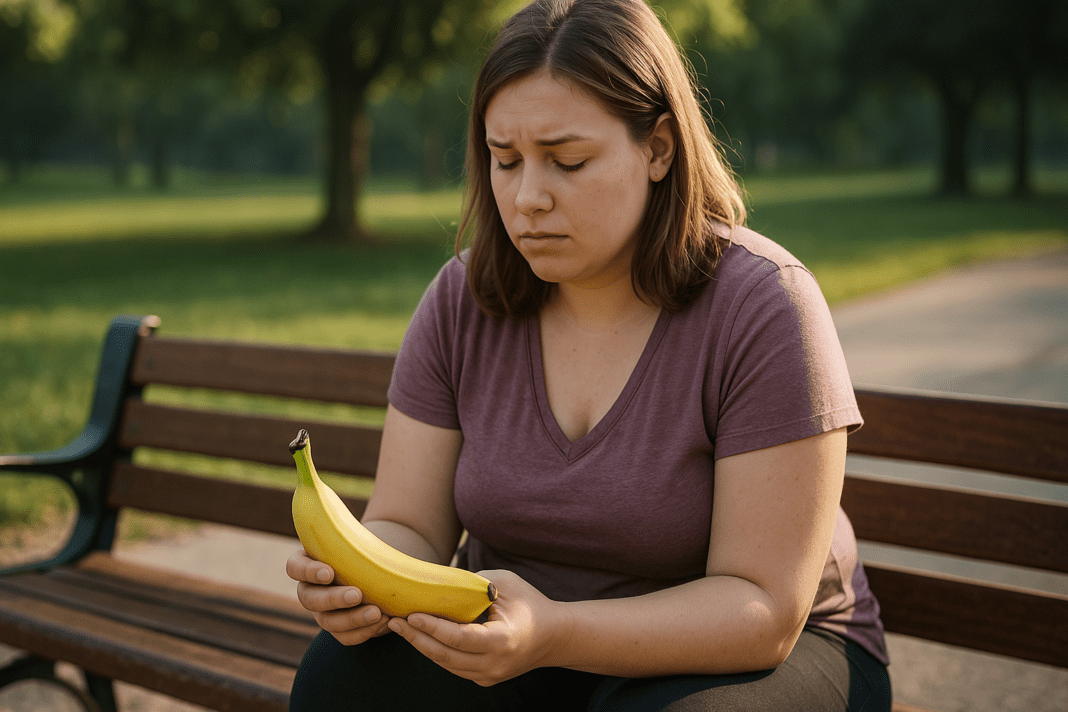Understanding the Role of Bananas in a Healthy Diet
Bananas have long been considered a convenient, naturally sweet, and potassium-rich snack, making them a staple in the diets of people around the world. Their portability, versatility, and satisfying texture make them a favorite among fitness enthusiasts and casual eaters alike. But when it comes to the topic of bananas and weight loss, opinions are often divided. Some argue that the natural sugars found in bananas can hinder weight loss progress, while others believe that their nutrient density and fiber content make them an ideal food for shedding excess pounds. The question at the center of this debate is simple: can bananas help you lose weight?
You may also like: Expert-Backed Weight Loss Tips for a Healthier Lifestyle: What You Need to Know for Long-Term Weight Control and Wellness
From a nutritional standpoint, bananas offer a wealth of benefits. A medium-sized banana contains roughly 105 calories, along with 3 grams of fiber, 1 gram of protein, and a significant dose of vitamins B6 and C, as well as potassium and magnesium. These nutrients support cardiovascular health, nerve function, and energy metabolism. The dietary fiber in bananas, particularly resistant starch and pectin, plays a role in promoting satiety and stabilizing blood sugar levels—both important factors in successful weight management. Yet, despite these qualities, some critics worry that bananas are too high in carbohydrates and sugar to be compatible with a fat loss plan.
To assess whether bananas are good for weight loss, it is essential to look beyond calorie content alone and consider the broader context of how whole foods influence hunger, metabolism, and overall dietary patterns. Rather than vilifying or glorifying bananas based on isolated nutritional facts, a more nuanced approach rooted in evidence-based nutrition and expert guidance is needed. In this article, we explore what science really says about bananas and weight loss, how they can be incorporated into a balanced diet, and whether eating a banana a day supports or sabotages your health goals.
Do Bananas Help You Lose Weight? What the Science Reveals
When evaluating whether bananas can help you lose weight, it’s important to focus on the total impact they have on satiety, energy balance, and metabolic health. One of the primary mechanisms through which bananas may support weight management is their fiber content. Fiber slows digestion and increases feelings of fullness, which can lead to a natural reduction in calorie intake throughout the day. Specifically, the pectin in ripe bananas and the resistant starch in greener bananas have been shown to delay gastric emptying and support gut health by feeding beneficial bacteria.
Numerous studies have linked higher fiber intake with a reduced risk of obesity. Although a banana may contain modest levels of fiber compared to other plant foods, its balance of carbohydrates and fiber makes it an effective tool in moderating hunger. Furthermore, the resistant starch found in less-ripe bananas behaves similarly to soluble fiber in the digestive tract, promoting fat oxidation and potentially enhancing insulin sensitivity—both of which are critical factors in healthy fat loss.
Research also indicates that bananas may have a low to moderate glycemic index, especially when not overly ripe. This means they have a relatively mild effect on blood sugar levels compared to high-glycemic snacks like candy or white bread. For individuals managing weight, maintaining stable blood glucose levels can help prevent cravings and energy crashes that lead to overeating. In this context, the question “do bananas help you lose weight?” finds strong support in the existing literature, especially when bananas are consumed as part of a balanced meal or snack.
Critics often point to the sugar content of bananas—around 14 grams in a medium fruit—as a reason to avoid them when trying to lose weight. However, it’s important to remember that this sugar occurs naturally and is packaged with fiber, vitamins, and minerals. Unlike refined sugars found in processed foods, the sugar in bananas is metabolized more slowly and is less likely to cause the kind of insulin spikes that contribute to fat storage. Thus, for most people, bananas can be a beneficial component of a healthy eating pattern focused on weight control.
Are Bananas Good for Weight Loss, or Should You Avoid Them?
The notion that eating bananas might be harmful to weight loss efforts is a common misconception rooted in outdated views about carbohydrates. The phrase “a banana a day keeps you from losing weight” has circulated in certain dieting circles, often without a firm scientific foundation. While it’s true that bananas contain more carbohydrates than some other fruits, labeling them as fattening is misleading and ignores the complex relationship between food quality, calorie intake, and weight management.
Bananas are not inherently fattening. Weight gain occurs when calorie intake consistently exceeds energy expenditure, regardless of the specific food sources. A banana provides just over 100 calories, which is a small fraction of most people’s daily energy needs. When included as part of a well-rounded diet, bananas are unlikely to interfere with fat loss and may actually support it by curbing cravings for high-calorie junk foods.
Another point often overlooked is the psychological impact of food restriction. Labeling foods like bananas as “off-limits” can create an unhealthy relationship with food and may backfire by increasing cravings and triggering binge-eating episodes. A more sustainable approach to weight loss focuses on dietary inclusion rather than exclusion—favoring whole, nutrient-dense foods like bananas while limiting ultra-processed items.
Still, it’s fair to acknowledge that individual responses to food vary. For people on very low-carb or ketogenic diets, even the moderate carb content in bananas may not align with their goals. In such cases, alternative fruits like berries may be preferred. But for the average individual pursuing a balanced, calorie-controlled diet, the idea that bananas prevent you from losing weight lacks credible support. In fact, asking “are bananas healthy for weight loss?” opens the door to a much more informed discussion about food synergy, portion control, and nutrition literacy.

Is Banana Good for Fat Loss? Timing, Ripeness, and Portion Size Matter
One of the most overlooked aspects in answering whether a banana is good for fat loss lies in the details of how and when it is consumed. Not all bananas are created equal, particularly in terms of ripeness. A greener banana contains more resistant starch, which has been associated with improved metabolic outcomes. This type of starch resists digestion and acts more like fiber, providing fewer digestible calories and enhancing satiety. In contrast, very ripe bananas have higher sugar content and lower resistant starch levels, though they still offer valuable nutrients.
The timing of banana consumption can also influence its effect on weight. Eating a banana before a workout provides a readily accessible source of natural carbohydrates, helping to fuel performance and endurance without the need for refined sugar-based energy drinks or snacks. Post-exercise, bananas help replenish glycogen stores and support muscle recovery thanks to their potassium and vitamin B6 content. Integrating bananas into these strategic moments can enhance fat-burning workouts and help maintain lean body mass during a weight loss phase.
Portion control, of course, remains key. While bananas are not high in calories, consuming multiple bananas daily without regard to overall energy intake can still disrupt a calorie deficit. For this reason, experts recommend enjoying bananas in moderation—usually one per day—as part of a diet that includes a variety of fruits and vegetables. In the context of this balance, the idea that bananas and weight loss are incompatible becomes far less convincing.
Practical examples of banana-friendly, weight-conscious meals include pairing a banana with plain Greek yogurt for protein and fiber synergy, adding banana slices to a high-fiber oatmeal breakfast, or blending a half banana into a protein smoothie. These combinations enhance fullness and reduce the likelihood of overeating later in the day. In this way, bananas contribute meaningfully to fat loss without becoming a caloric burden.
Why Does Eating Banana Prevent You from Losing Weight? Debunking the Myth
The belief that eating bananas prevents weight loss is one of the more persistent myths in modern diet culture. This claim is usually based on the premise that bananas are too high in sugar or carbohydrates to fit into a weight loss plan. However, as we have established, weight loss is far more dependent on total energy balance than on the exclusion of any single food. Still, it is worth exploring where this myth originates and why it continues to thrive.
One reason is the confusion surrounding fructose, the natural sugar found in bananas and many other fruits. Some sources have sensationalized the potential dangers of fructose, claiming it contributes to insulin resistance and weight gain. While it’s true that excessive intake of added fructose—especially from high-fructose corn syrup—is harmful, the small amount of naturally occurring fructose in bananas is not linked to these adverse effects in healthy individuals. The body processes fructose from whole fruit differently than it does from processed foods, and the fiber content in bananas helps mitigate any potential blood sugar spikes.
Another contributing factor is the rise of low-carb and keto diets, which emphasize carbohydrate restriction as the primary method for fat loss. In these dietary frameworks, bananas are often excluded due to their carb content. However, this does not mean bananas inherently prevent fat loss; rather, they may not align with the rules of a specific diet. For the general population, especially those not following a therapeutic or medical ketogenic diet, bananas remain a viable and nutritious food choice.
Ultimately, the idea that bananas are a roadblock to weight loss stems from an oversimplified view of nutrition. When evaluating whether bananas and weight loss are compatible, it’s essential to look at overall dietary patterns, physical activity, and long-term habits. Excluding bananas without understanding their nutritional value may do more harm than good by reducing dietary diversity and satisfaction.
Are Bananas Healthy for Weight Loss? Balancing Nutrition and Satisfaction
When asking whether bananas are healthy for weight loss, it is important to expand the definition of health beyond calories and carbohydrates. True health-promoting foods not only support weight control but also contribute to long-term wellness, disease prevention, and emotional satisfaction. In this sense, bananas are a model example of a food that offers both nourishment and enjoyment, which are key pillars of sustainable weight management.
Bananas are rich in nutrients that promote heart health, such as potassium, which helps regulate blood pressure, and magnesium, which supports nerve and muscle function. Their high antioxidant content, including dopamine and vitamin C, helps combat oxidative stress and inflammation—both of which can contribute to metabolic dysfunction and obesity. Furthermore, bananas provide prebiotic compounds that feed healthy gut bacteria, thereby supporting digestion and possibly influencing weight through the gut-brain axis.
Emotional satisfaction is another critical factor. Diets that are overly restrictive or devoid of pleasurable foods tend to have high failure rates. Including naturally sweet fruits like bananas can reduce the psychological burden of dieting and help individuals maintain healthy habits over time. For example, replacing processed desserts with banana-based alternatives—such as frozen banana “nice cream” or banana oat cookies—can offer a compromise between indulgence and nutrition.
Moreover, bananas are affordable and widely accessible, making them a realistic choice for people from all economic backgrounds. Their availability and shelf-stability make it easier to make nutritious choices without relying on expensive or exotic ingredients. For individuals looking to lose weight without sacrificing budget or convenience, bananas offer a practical and evidence-backed option.

Frequently Asked Questions (FAQ): Can Bananas Help You Lose Weight?
1. Can eating bananas at night affect weight loss efforts?
While eating late at night is often discouraged for weight loss, the timing of banana consumption should be understood in context. If a banana is replacing a high-calorie snack like cookies or chips before bed, it may actually benefit your overall dietary pattern. However, because bananas contain natural sugars and carbohydrates, eating them right before sleep without accounting for their calories could mildly affect energy balance. That said, for individuals who experience nighttime hunger or sleep-related hypoglycemia, bananas offer a better alternative to processed snacks. In terms of bananas and weight loss, the key is not necessarily the time you eat them, but how they fit into your total daily intake.
2. Are certain types of bananas better for weight loss than others?
Yes, not all bananas are created equal when it comes to supporting fat loss. For example, greener bananas are higher in resistant starch, a compound that resists digestion and supports gut health while keeping you fuller longer. These types of bananas may offer better metabolic benefits than fully ripe ones. On the other hand, smaller varieties like baby bananas can help with portion control while still delivering essential nutrients. Understanding which type aligns best with your goals can help answer the question, are bananas good for weight loss—and in many cases, the answer depends on both the banana’s ripeness and size.
3. Can bananas help curb sugar cravings during weight loss?
Absolutely. One of the most practical roles bananas play in a weight management strategy is as a tool to curb sugar cravings. When you’re reducing processed sugars to create a calorie deficit, bananas offer a naturally sweet, nutrient-dense option that satisfies the desire for dessert without triggering a sugar binge. Instead of falling into the trap of believing that a banana a day keeps you from losing weight, consider how it could replace a nutritionally empty snack. In this way, can bananas help you lose weight becomes a question of substitution, not restriction.
4. What are some creative ways to include bananas in a fat loss-friendly diet?
There are plenty of ways to enjoy bananas without sabotaging your weight goals. For instance, you can slice half a banana into steel-cut oats for a filling breakfast, or blend it with unsweetened almond milk and protein powder for a post-workout smoothie. Bananas also work well in baking recipes that reduce or eliminate added sugar, such as banana oat muffins or banana pancakes made with egg and cinnamon. These applications make it easier to see how bananas and weight loss can complement one another, especially when used in nutrient-balanced meals.
5. Do bananas affect fat storage or metabolism directly?
While bananas don’t directly burn fat, some of their nutritional properties can influence metabolism in supportive ways. Resistant starch found in under-ripe bananas may enhance fat oxidation by improving insulin sensitivity and lowering the glycemic response. Moreover, bananas are rich in vitamin B6, which plays a role in carbohydrate metabolism, and magnesium, which helps regulate blood sugar. Saying is banana good for fat loss might oversimplify the process, but in the context of supporting metabolic health, bananas can certainly play a positive role. They may not be a “fat-burning food,” but they don’t promote fat storage either when consumed in moderation.
6. Could eating too many bananas negatively impact weight loss goals?
Yes, as with any food, excessive banana consumption could lead to excess calorie intake, which undermines fat loss. One medium banana contains around 105 calories, and eating several per day without adjusting the rest of your intake could put you in a calorie surplus. This may fuel the belief that eating banana prevents you from losing weight, but the issue lies in quantity and context—not the banana itself. Balancing banana consumption with other fruits and nutrient-dense foods ensures you gain the benefits without tipping the scale in the wrong direction. So, moderation and dietary context remain critical.
7. Are bananas suitable for people on low-carb or ketogenic diets aiming for fat loss?
Bananas are relatively high in carbohydrates compared to other fruits, so they may not fit into strict ketogenic diets where carb intake is heavily restricted. For those following moderate low-carb diets, half a banana may be appropriate depending on personal macros. In these scenarios, some people may wonder, why does eating banana prevent you from losing weight—but in reality, it’s more about carb thresholds than inherent banana properties. Individuals on these diets may prefer berries due to their lower sugar content, but bananas can still be enjoyed occasionally if adjusted within daily carb limits.
8. Do bananas provide long-term benefits for sustained weight management?
Yes, bananas can be part of a sustainable weight maintenance plan thanks to their role in satiety, digestive health, and energy regulation. Because they are convenient, budget-friendly, and widely available, bananas encourage consistency in healthy eating patterns—an often overlooked factor in long-term weight control. Their potassium content also helps with muscle function and fluid balance, especially valuable for those engaging in regular exercise. When people ask, are bananas healthy for weight loss, they should also consider how such accessible foods make adherence easier. Weight maintenance is as much about lifestyle as it is about nutrition, and bananas can bridge both worlds effectively.
9. How does the psychological impact of restricting bananas affect dieting success?
Over-restricting foods like bananas can lead to an unhealthy relationship with eating and may increase the risk of binge behavior or diet fatigue. Labelling bananas as “bad” due to carb content can instill fear around fruit consumption, even though bananas contain no added sugars or artificial ingredients. This mindset makes it easy to misunderstand questions like do bananas help you lose weight by shifting focus from overall patterns to single foods. Incorporating bananas mindfully allows dieters to enjoy variety, which improves satisfaction and lowers the chance of falling off a weight loss plan. From a behavioral nutrition perspective, psychological well-being is just as crucial as physical results.
10. Are there populations for whom bananas are especially beneficial during weight loss?
Yes, certain groups can benefit more from bananas during weight loss efforts. Athletes and active individuals, for example, can use bananas as a quick energy source before or after workouts, promoting recovery and preventing muscle loss. Older adults who may struggle with appetite can also use bananas to boost caloric intake with nutrient-rich foods rather than relying on supplements or empty calories. People with digestive issues may find that bananas support gentle bowel regularity due to their fiber and prebiotic content. When considering whether bananas and weight loss are compatible, it’s important to personalize the answer based on lifestyle and health status. This makes the question can bananas help you lose weight deeply individual, rather than one-size-fits-all.

Final Thoughts: Can Bananas Help You Lose Weight and Support a Healthier Diet?
After exploring the nutritional science, expert opinions, and practical applications surrounding bananas and weight loss, the answer to whether bananas can help you lose weight becomes clear: yes, they can—when eaten in moderation and as part of a well-balanced, nutrient-dense diet. Far from being an obstacle to fat loss, bananas offer a wealth of benefits that support satiety, energy balance, metabolic function, and overall dietary satisfaction.
Contrary to the myth that a banana a day keeps you from losing weight, evidence shows that bananas can play a positive role in weight control thanks to their fiber content, natural sugars, and impressive nutrient profile. The key lies in how they are used: choosing the right ripeness level, paying attention to portion size, and pairing them with other whole foods to create meals that are both nourishing and satiating.
For those wondering “are bananas good for weight loss?” or “is banana good for fat loss?”, it is vital to take a holistic view. No single food will make or break a weight loss effort, and overly simplistic rules tend to backfire in the long run. What matters most is the consistency of healthy habits, the quality of one’s overall diet, and the inclusion of foods that are both nutritionally valuable and enjoyable to eat.
Incorporating bananas into your daily routine—whether as a workout snack, part of a balanced breakfast, or a wholesome dessert—can enhance your dietary pattern and support sustainable weight management. So the next time you hear someone ask, “why does eating banana prevent you from losing weight?” you’ll have the evidence and understanding to respond with confidence, backed by science and supported by common sense.
fruit for weight loss, healthy snacking ideas, low calorie fruits, weight management tips, fiber rich foods, natural appetite suppressants, nutritious diet choices, belly fat reduction foods, metabolism boosting snacks, whole foods for dieting, portion control strategies, healthy carbs for weight loss, sugar in fruit and dieting, plant-based weight loss, best fruits for fat loss, dietitian weight loss advice, healthy eating for weight loss, fruits with low glycemic index, smart dieting strategies, weight loss friendly foods
Further Reading:
Benefits and health risks of bananas
Are Bananas Fattening or Weight-Loss-Friendly?
Banana Diet: Weight Loss, Rules & Meal Plan
Disclaimer
The information contained in this article is provided for general informational purposes only and is not intended to serve as medical, legal, or professional advice. While MedNewsPedia strives to present accurate, up-to-date, and reliable content, no warranty or guarantee, expressed or implied, is made regarding the completeness, accuracy, or adequacy of the information provided. Readers are strongly advised to seek the guidance of a qualified healthcare provider or other relevant professionals before acting on any information contained in this article. MedNewsPedia, its authors, editors, and contributors expressly disclaim any liability for any damages, losses, or consequences arising directly or indirectly from the use, interpretation, or reliance on any information presented herein. The views and opinions expressed in this article are those of the author(s) and do not necessarily reflect the official policies or positions of MedNewsPedia.


